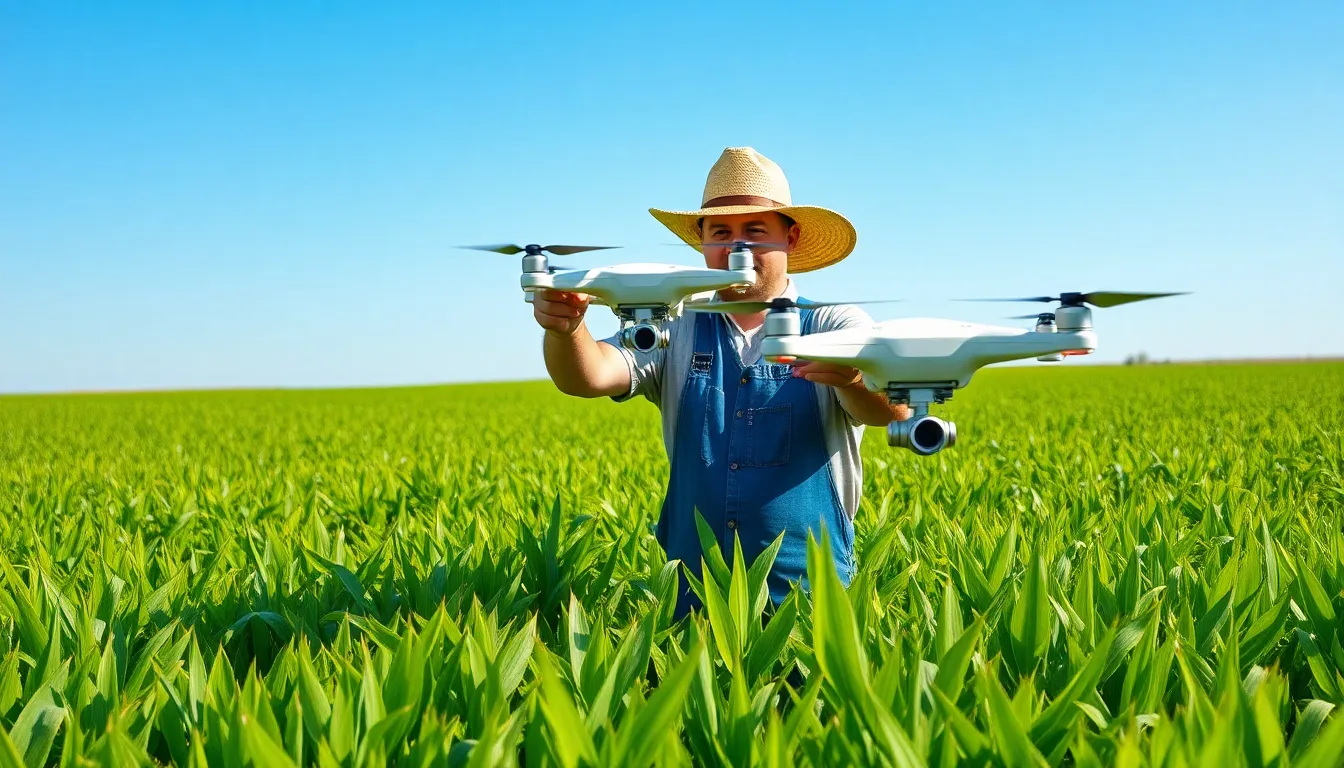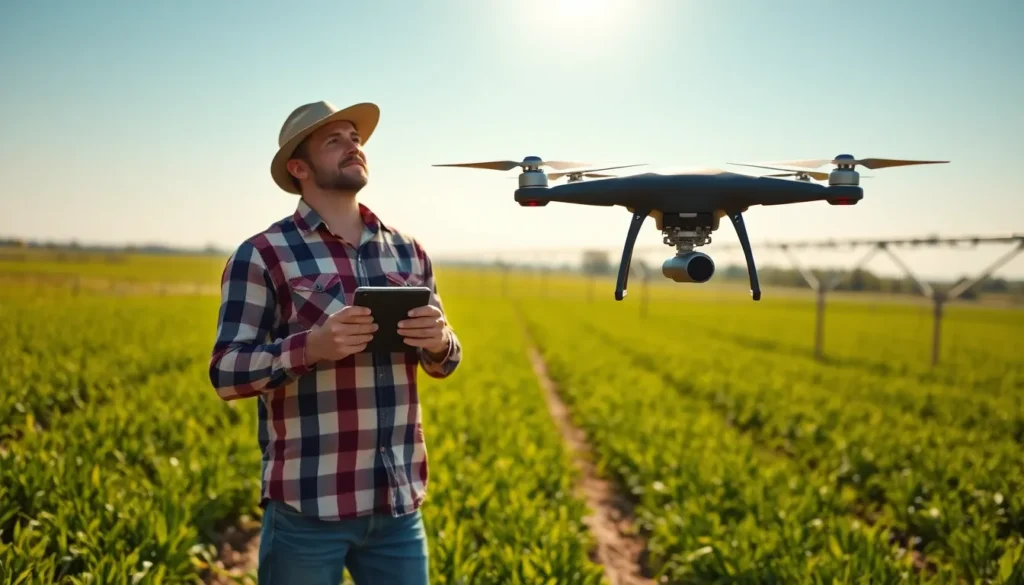Table of Contents
ToggleIn a world where the only thing growing faster than our population is our appetite for food, sustainable farming technology steps in like a superhero with a cape made of compost. Gone are the days of farming that leaves the Earth gasping for breath. Today’s farmers are embracing innovations that not only boost yields but also keep Mother Nature smiling.
Imagine drones buzzing overhead, precision irrigation systems that water only what’s necessary, and sensors that talk to crops like they’re old friends. This isn’t science fiction; it’s the future of farming! By adopting these technologies, farmers can produce more while using fewer resources. So buckle up and get ready to explore how sustainable farming technology is transforming agriculture into an eco-friendly powerhouse—because who says saving the planet can’t be a little fun?
Overview of Sustainable Farming Technology
Sustainable farming technology encompasses a range of innovative practices aimed at improving agricultural efficiency while protecting the environment. These technologies address challenges related to population growth and food demand. Drones serve as valuable tools for crop monitoring, allowing farmers to identify issues early and respond promptly.
Precision irrigation systems play a crucial role in optimizing water usage, minimizing waste, and maximizing crop health. Crop sensors provide real-time data on soil conditions and plant health, enabling targeted interventions. Integrating these technologies can lead to significant increases in yield and reductions in resource consumption.
Automation in farming also contributes to sustainability. Robotic systems, equipped with advanced algorithms and sensors, assist with planting, weeding, and harvesting, reducing labor costs and human intervention. The integration of artificial intelligence in analytics helps farmers make data-driven decisions, improving overall productivity.
Adoption of sustainable farming technology reflects a broader commitment to eco-friendly practices. By reducing chemical inputs and enhancing soil health, these technologies not only benefit the environment but also support the long-term viability of agriculture. These advancements are essential for meeting future food needs while preserving natural resources.
Implementation of solar panels and wind turbines within farms highlights the commitment to renewable energy. These sustainable power sources help reduce reliance on fossil fuels, subsequently lowering the carbon footprint. This holistic approach emphasizes the importance of sustainable farming technology in building a resilient global food system.
Benefits of Sustainable Farming Technology

Sustainable farming technology offers numerous advantages that contribute to environmental health and economic resilience. These benefits shape the future of agriculture positively.
Environmental Impact
Adoption of sustainable farming technology significantly reduces environmental degradation. Precision irrigation systems decrease water waste, conserving valuable resources. Drones enhance crop monitoring, enabling timely interventions that decrease pesticide usage. Crop sensors provide essential data, allowing targeted applications of fertilizers, which minimizes nutrient runoff. Soil health improves with fewer chemical inputs, promoting biodiversity. Furthermore, integrating renewable energy on farms, like solar panels and wind turbines, lowers carbon emissions, creating a more sustainable farming ecosystem.
Economic Advantages
Economic benefits accompany the integration of sustainable farming technologies. Yield increases from precision agriculture improve farmers’ profitability. Automation through robotic systems cuts labor costs, allowing for reallocation of resources. Data-driven insights from artificial intelligence lead to informed decision-making, optimizing crop management. Reduced chemical inputs also lower expenses associated with fertilizers and pesticides. By embracing these technologies, farmers not only enhance their competitiveness but build resilience against market fluctuations, supporting their long-term financial stability.
Key Innovations in Sustainable Farming Technology
Sustainable farming technology features several key innovations transforming agriculture.
Precision Agriculture
Precision agriculture employs GPS technology and satellite imagery to enhance farming efficiency. By enabling detailed field mapping, it allows farmers to monitor crop health and soil conditions accurately. Sensors provide real-time data on moisture levels, guiding irrigation efforts effectively. Farmers optimize inputs, such as water and fertilizers, reducing waste. As a result, precision agriculture leads to increased yields and minimized environmental impact.
Hydroponics and Aquaponics
Hydroponics and aquaponics are innovative methods of growing crops without soil. Hydroponics relies on nutrient-rich water solutions, supporting faster plant growth and higher density cultivation. Aquaponics combines fish farming with crop production, creating a symbiotic relationship between aquatic life and plants. This closed-loop system minimizes water usage and promotes sustainable practices. Both methods reduce the need for arable land, making them viable solutions for urban agriculture.
Biodegradable Materials
Biodegradable materials play an essential role in sustainable farming by replacing traditional plastics. Agricultural films, seedling trays, and packaging made from these materials break down naturally, reducing waste. They limit plastic pollution and enhance soil health as they decompose. Farmers utilizing biodegradable products contribute to a more sustainable environment while maintaining operational efficiency. These advancements help both the planet and the agriculture industry move toward a greener future.
Challenges in Implementing Sustainable Farming Technology
Implementing sustainable farming technology faces several challenges that affect its adoption.
Cost Barriers
High initial costs hinder many farmers from adopting sustainable technologies. Purchasing equipment like drones and precision irrigation systems necessitates substantial investments. Farmers might find financing options limited, which can deter them from making necessary upgrades. Maintenance costs also add to the financial burden, as maintaining sophisticated systems requires ongoing expenses. Larger farms often benefit from economies of scale, making it crucial for smaller operations to explore cost-sharing initiatives. Finding incentives or governmental support programs can also play an important role in reducing overall costs, making sustainable practices more accessible.
Education and Training
Access to education and training on sustainable farming technologies is limited in many regions. Many farmers lack familiarity with advanced technologies, posing a barrier to effective implementation. Training programs can help bridge knowledge gaps, but often, they are not widely available or affordable. Collaborations between universities, industry experts, and local governments can enhance educational outreach. Additionally, ongoing support and resources for farmers ensure that they feel confident in utilizing these technologies effectively. Prioritizing education empowers farmers to make informed decisions, ultimately leading to better outcomes for sustainability and productivity.
Sustainable farming technology is reshaping the agricultural landscape by promoting eco-friendly practices and enhancing productivity. As farmers adopt innovative solutions like precision irrigation and automation, they not only increase their yields but also contribute to environmental health. The integration of renewable energy sources further underscores the commitment to a sustainable future.
While challenges such as cost barriers and the need for education remain, ongoing support from governmental programs and industry collaborations can pave the way for broader adoption. By embracing these advancements, farmers are better prepared to meet the demands of a growing population while ensuring the long-term viability of agriculture. The path forward is clear—sustainable farming technology is key to building a resilient food system for generations to come.







